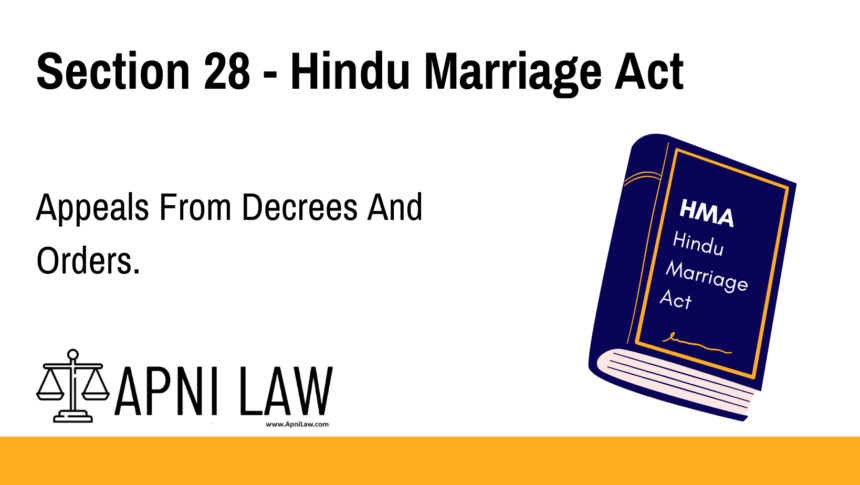Hindu Marriage Act Section 28 – Appeals from decrees and orders
Code:
(1) All decrees made by the court in any proceeding under this Act shall, subject to the provisions of sub-section (3), be appealable as decrees of the court made in the exercise of its original civil jurisdiction, and every such appeal shall lie to the court to which appeals ordinarily lie from the decisions of the court given in the exercise of its original civil jurisdiction.
(2) Orders made by the court in any proceeding under this Act under section 25 or section 26 shall, subject to the provisions of sub-section (3), be appealable if they are not interim orders, and every such appeal shall lie to the court to which appeals ordinarily lie from the decisions of the court given in exercise of its original civil jurisdiction.
(3) There shall be no appeal under this section on the subject of costs only.
(4) Every appeal under this section shall be preferred within a period of ninety days from the date of the decree or order.
Explanation:
This section outlines the appeal process for decrees and orders made under the Hindu Marriage Act, 1955. It defines which decrees and orders are appealable, the time limit for appealing, and the court to which appeals can be filed.
- Sub-section (1): It states that all decrees made by the court under this Act are appealable. The appeals are to be filed in the court which usually handles appeals from the original court’s decisions.
- Sub-section (2): This subsection specifies that orders made under sections 25 (Restitution of Conjugal Rights) and 26 (Judicial Separation) are also appealable. However, interim orders (temporary orders) are not appealable.
- Sub-section (3): This subsection excludes appeals solely based on the issue of costs (expenses) incurred in the proceedings.
- Sub-section (4): This subsection sets the time limit for filing appeals. Appeals must be filed within 90 days from the date of the decree or order.
Illustration
For example, if a court grants a decree of divorce under the Hindu Marriage Act, the aggrieved party can appeal against this decree within 90 days. The appeal would be filed in the higher court that typically hears appeals from the original court.
Common Questions and Answers
Q: What types of decrees and orders are appealable under this section?
A: All decrees made by the court under the Hindu Marriage Act, orders under sections 25 and 26 (except interim orders), and orders that are not solely about costs, are appealable.
Q: How long do I have to file an appeal?
A: You have 90 days from the date of the decree or order to file an appeal.
Q: Where should I file my appeal?
A: You should file your appeal in the court that handles appeals from the original court that made the decree or order.
Q: Can I appeal an order about the costs of the proceedings?
A: No, you cannot appeal an order solely about the costs of the proceedings.











